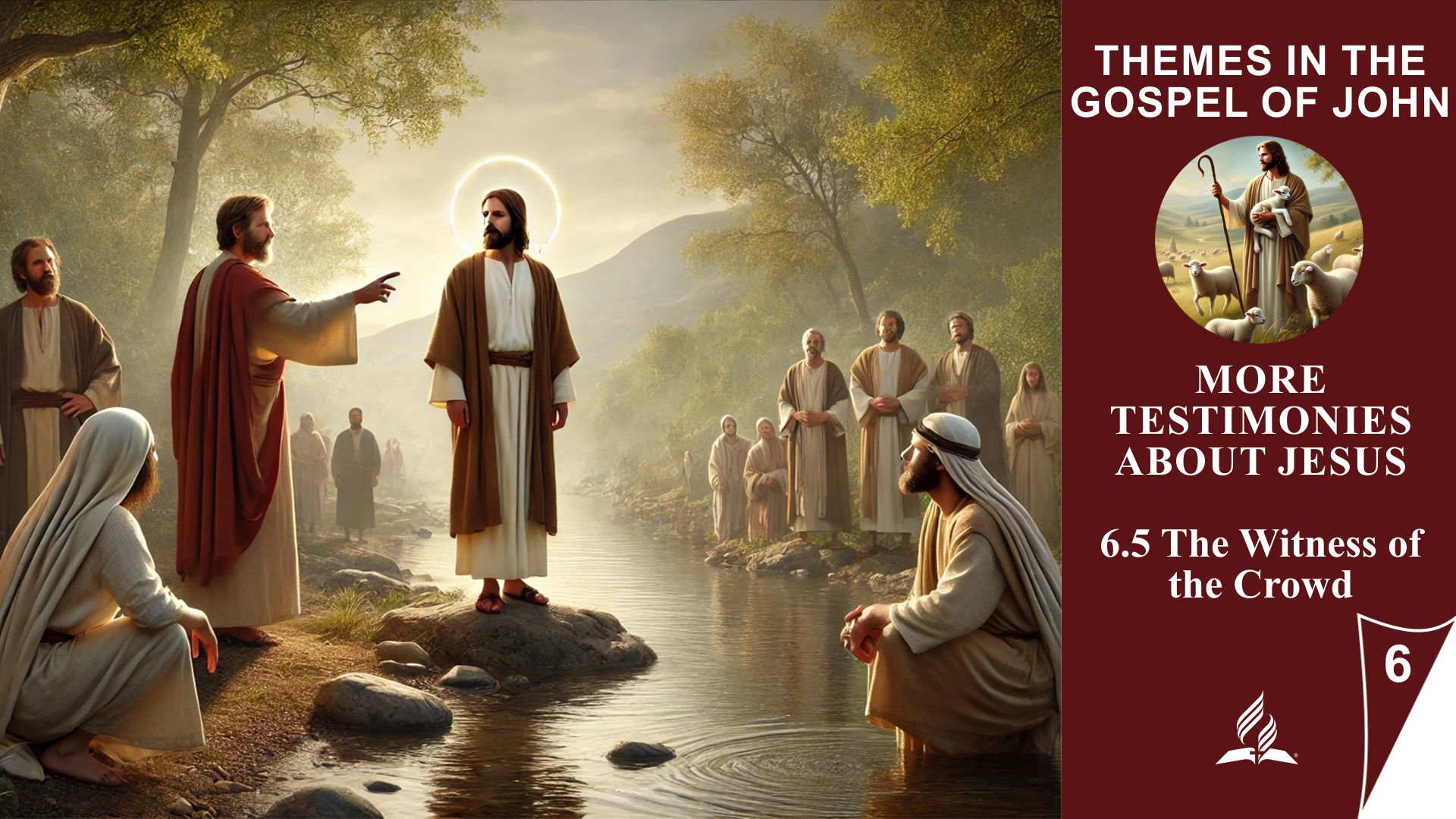


6.5 The Witness of the Crowd
Divided Belief and Questions About Jesus’ Origin
How did many in the crowd react when Jesus spoke to the Jews participating in the Feast of Tabernacles? John 7:37–53
In John 7:37–38, Jesus invites people during the Feast of Tabernacles to come to Him and drink, promising them streams of living water. These words, which point to the fulfillment of spiritual thirst and the gift of the Holy Spirit, are a bold self-testimony. Jesus presents Himself as the source of life that can quench the deep thirst of the soul. His statements elicit a variety of reactions from the crowd—admiration, confusion, and resistance.
The crowd was divided in their opinions about Jesus. Some recognized Him as the long-awaited prophet or the Christ, while others remained skeptical, held back by misunderstandings about His origin. These disagreements highlight the challenge that Jesus’ words and works posed and the difficulty for many to go beyond their previous notions to grasp Jesus’ true identity.
Interestingly, even the officials sent to arrest Jesus were so impressed by His wisdom and authority that they left Him unharmed. Their astonishment at Jesus’ words shows how powerful and compelling His message was. Despite this fascination, the resistance from the religious leaders persisted, as they wondered why none of them believed in Jesus, as if their judgment were final.
Nicodemus, a Pharisee, steps forward at this moment and reminds his colleagues of the law: it requires that a person be heard before judgment is passed. This remark indicates that Nicodemus has maintained an openness to Jesus’ message and may eventually come to believe in Him. Nicodemus’ later actions after Jesus’ death suggest that he ultimately recognized Jesus as the Messiah.
This episode illustrates that Jesus did not operate without resistance on earth. His ministry and words challenged people to make decisions and showed that true discipleship often requires a conscious and personal choice, regardless of the majority’s opinion. The testimony of the crowd reminds us that faith in Jesus often means questioning our own beliefs and assumptions and having the courage to make a personal decision for Him—even if that decision is in the minority.
Read John 7:49. What did the leaders say that showed their contempt for the crowds following Jesus? What lesson can we learn from this?
In John 7:49, the religious leaders say, “These people who do not know the law are cursed!” This statement reveals their deep-seated contempt and arrogance toward the crowds following Jesus. The leaders view ordinary people as ignorant and easily led followers. Instead of seeing them as individuals seeking truth and meaning, they see them as “cursed” and inferior because they do not meet their religious standards.
From the leaders’ reaction, we can draw an important lesson about humility and compassion in faith:
-
Arrogance and Pride Separate from God’s Heart
The religious leaders considered themselves superior due to their knowledge and looked down on others. This attitude blocked their access to the true understanding of Jesus and God’s love. For us, this serves as a warning that spiritual arrogance or elitist thinking can blind us to God’s work. True faith is based on humility and the willingness to seek and recognize God’s truth in all people.
-
The Danger of Judging Others Based on Their Knowledge
The leaders dismissed people because they “do not know the law.” However, Jesus Himself demonstrated that true closeness to God does not depend on a certain level of education or intellectual knowledge but on a sincere and open heart. This insight invites us to refrain from judging people based on their level of education or knowledge and instead accept them with love and understanding.
-
Compassion and Openness for All People
The leaders’ contempt contrasts with Jesus’ compassion for the crowd. Jesus engaged with the weak, the seekers, and the despised. For us, following Jesus means showing compassion and remaining open, especially to those who may know less about the faith but have an open heart.
-
Teaching Instead of Contempt
When we view people as ignorant or “lost” without supporting and teaching them, we miss the mission of the Gospel. Jesus took the time to reveal God’s truth to people and teach them. This is an invitation to accompany others patiently and lovingly instead of judging them based on their current level of knowledge.
Overall, this passage reminds us to maintain humility and view all people as valuable recipients of God’s love and truth. Contempt and arrogance lead to separation from God’s heart, while compassion and openness enable us to act truly in the spirit of Jesus.
The connection of these events with our daily lives and faith shows how important it is to maintain an open heart and a humble attitude in following Jesus. Here are some concrete aspects of how this lesson can shape our daily lives and faith:
-
Humility Instead of Arrogance in Interacting with Others
The religious leaders were guided by their own arrogance and looked down on the crowd. Similarly, in our daily lives, we may tend to judge people based on their level of knowledge or social status. However, the story reminds us that true spiritual greatness lies in humility—in meeting all people with respect and openness, just as Jesus did.
-
Openness to God’s Work in Every Person
Jesus attracted people from all walks of life—from simple fishermen to scholars like Nicodemus. For us, this is an invitation to remain open and recognize that God’s Spirit can work in every person, regardless of their background, knowledge, or social position. It helps us avoid making hasty judgments and instead seek what God is doing in and through each individual.
-
Compassion and Acceptance Instead of Judgment
The religious leaders saw the crowd merely as people who did not know the law and thus “cursed.” For us, this means that true discipleship requires showing compassion and having an accepting attitude, even toward those who are at different stages of faith or knowledge. In daily life, we can approach people with an open heart and try to support them instead of judging them.
-
Faith as a Personal Decision, Not a Majority Opinion
The crowd was divided over Jesus’ identity, and many followed Him only to a certain extent. The story reminds us that genuine faith often involves a personal and conscious decision that must be made independently of the majority’s opinion. In daily life, this may mean holding firm to our beliefs even when they are unpopular or when the majority holds a different view.
-
A Heart for Those Seeking Truth
Jesus did not only present Himself as the source of living water but also took time for the despised and the seekers. This attitude invites us to reach out especially to those who are in a phase of seeking truth. It encourages us to listen patiently and bring God’s love closer to them through compassion and patience.
-
Willingness to Teach and Support
Jesus’ attitude toward the crowd was not one of contempt but of a desire to lead them to God’s truth. We are also invited to help others in faith and share our knowledge and experiences without looking down on them. This means being patient, showing understanding, and growing together.
In summary, this passage teaches us how essential humility, openness, and compassion are in truly following Jesus. When we shape our lives in this way, God’s love and mercy are reflected in our actions, enabling us to be authentic testimonies for the faith.

True greatness lies in meeting others with humility and compassion, even when they are different from us.
(Visited 23 times, 1 visits today)





















